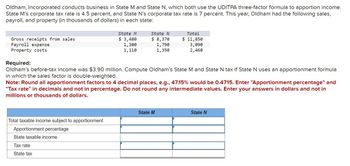
FINANCIAL ACCOUNTING
10th Edition
ISBN: 9781259964947
Author: Libby
Publisher: MCG
expand_more
expand_more
format_list_bulleted
Question
Subject: accounting

Transcribed Image Text:Oldham, Incorporated conducts business in State M and State N, which both use the UDITPA three-factor formula to apportion income.
State M's corporate tax rate is 4.5 percent, and State N's corporate tax rate is 7 percent. This year, Oldham had the following sales,
payroll, and property (in thousands of dollars) in each state:
Gross receipts from sales
Payroll expense
Property costs
State M
$ 3,480
1,300
1,110
State N
$ 8,370
1,790
1,350
Total taxable income subject to apportionment
Apportionment percentage
State taxable income
Tax rate
State tax
Required:
Oldham's before-tax income was $3.90 million. Compute Oldham's State M and State N tax if State N uses an apportionment formula
in which the sales factor is double-weighted.
Total
$ 11,850
3,090
2,460
Note: Round all apportionment factors to 4 decimal places, e.g., 47.15% would be 0.4715. Enter "Apportionment percentage" and
"Tax rate" in decimals and not in percentage. Do not round any intermediate values. Enter your answers in dollars and not in
millions or thousands of dollars.
State M
State N
Expert Solution
This question has been solved!
Explore an expertly crafted, step-by-step solution for a thorough understanding of key concepts.
Step by stepSolved in 3 steps

Knowledge Booster
Learn more about
Need a deep-dive on the concept behind this application? Look no further. Learn more about this topic, accounting and related others by exploring similar questions and additional content below.Similar questions
- what the difference between accounting income and economic income?arrow_forwardRequired information Skip to question [The following information applies to the questions displayed below.] The following is financial information describing the six operating segments that make up Chucktown Sauce Company (in thousands): Segments Red $ 1,817 22 Sales to outside parties Intersegment revenues Salary expense Rent expense Interest expense (92) Income tax expense (savings) 147 Consider the following questions independently. None of the six segments have a primarily financial nature. c. What volume of revenues must a single customer generate to necessitate disclosing the existence of a major customer? Note: Enter your answer in dollars but not in thousands. 620 145 Blue Green Pink Black White $ 818 $520 $315 $127 $ 105 97 115 0 308 71 385 408 318 172 87 65 93 88 67 22 55 323 98 48 37 68 20 11 (70) 0arrow_forwardDistinguish between Income and Expenditure Account and Receiptand Payment Account.arrow_forward
arrow_back_ios
arrow_forward_ios
Recommended textbooks for you

 AccountingAccountingISBN:9781337272094Author:WARREN, Carl S., Reeve, James M., Duchac, Jonathan E.Publisher:Cengage Learning,
AccountingAccountingISBN:9781337272094Author:WARREN, Carl S., Reeve, James M., Duchac, Jonathan E.Publisher:Cengage Learning, Accounting Information SystemsAccountingISBN:9781337619202Author:Hall, James A.Publisher:Cengage Learning,
Accounting Information SystemsAccountingISBN:9781337619202Author:Hall, James A.Publisher:Cengage Learning, Horngren's Cost Accounting: A Managerial Emphasis...AccountingISBN:9780134475585Author:Srikant M. Datar, Madhav V. RajanPublisher:PEARSON
Horngren's Cost Accounting: A Managerial Emphasis...AccountingISBN:9780134475585Author:Srikant M. Datar, Madhav V. RajanPublisher:PEARSON Intermediate AccountingAccountingISBN:9781259722660Author:J. David Spiceland, Mark W. Nelson, Wayne M ThomasPublisher:McGraw-Hill Education
Intermediate AccountingAccountingISBN:9781259722660Author:J. David Spiceland, Mark W. Nelson, Wayne M ThomasPublisher:McGraw-Hill Education Financial and Managerial AccountingAccountingISBN:9781259726705Author:John J Wild, Ken W. Shaw, Barbara Chiappetta Fundamental Accounting PrinciplesPublisher:McGraw-Hill Education
Financial and Managerial AccountingAccountingISBN:9781259726705Author:John J Wild, Ken W. Shaw, Barbara Chiappetta Fundamental Accounting PrinciplesPublisher:McGraw-Hill Education


Accounting
Accounting
ISBN:9781337272094
Author:WARREN, Carl S., Reeve, James M., Duchac, Jonathan E.
Publisher:Cengage Learning,

Accounting Information Systems
Accounting
ISBN:9781337619202
Author:Hall, James A.
Publisher:Cengage Learning,

Horngren's Cost Accounting: A Managerial Emphasis...
Accounting
ISBN:9780134475585
Author:Srikant M. Datar, Madhav V. Rajan
Publisher:PEARSON

Intermediate Accounting
Accounting
ISBN:9781259722660
Author:J. David Spiceland, Mark W. Nelson, Wayne M Thomas
Publisher:McGraw-Hill Education

Financial and Managerial Accounting
Accounting
ISBN:9781259726705
Author:John J Wild, Ken W. Shaw, Barbara Chiappetta Fundamental Accounting Principles
Publisher:McGraw-Hill Education